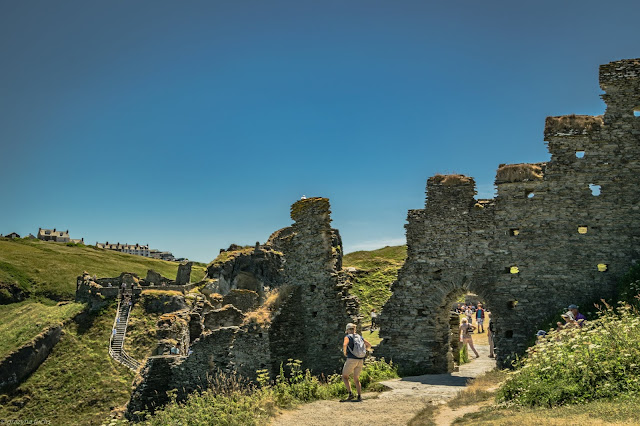Tintagel Castle is a castle located on Tintagel Island, a peninsula
connected to the North Cornwall coast in England by a narrow strip of
land. This castle has been an important stronghold from
around the end of Roman rule in Britain, i.e. the 4th century AD, or the
5th century AD until the end of the 7th century AD. Tintagel Castle is
perhaps best known for the claim that it was the place where the
legendary King Arthur was conceived.
Before Richard, Earl of Cornwall, built his castle in 1233, Tintagel was
already associated in legend with the conception of King Arthur by
Uther Pendragon, the result of his seduction of Queen Igraine. Richard's castle was built to reinforce his
connections with Arthur and the ancient rulers of Cornwall. This
Arthurian connection was later renewed by Alfred, Lord Tennyson, in his
Victorian 'Idylls of the King'.

After a period as a Roman settlement and military outpost, Tintagel became a trading settlement of Celtic kings of Cornwall during the 5th and 6th centuries. Legend has it that one of these was King Mark, whose nephew Tristan fell in love with Yseult ( Isolde). Their doomed romance is part of Tintagel's story.

The remains of the 13th century castle are breathtaking. Steep stone steps, stout walls and rugged windswept cliff edges encircle the great hall, where Richard, Earl of Cornwall, once feasted.

High-status imported Mediterranean pottery of the 5th and 6th centuries was found, as well as some fragments of fine glass believed to be from 6th or 7th century Málaga in Spain. Even more remarkable was a 1,500 year-old piece of slate on which remained two Latin inscriptions. The second inscription reads: 'Artognou, father of a descendant of Coll, has had (this) made.' Who exactly Artognou was continues to be the subject of lively speculation.

After a period as a Roman settlement and military outpost, Tintagel became a trading settlement of Celtic kings of Cornwall during the 5th and 6th centuries. Legend has it that one of these was King Mark, whose nephew Tristan fell in love with Yseult ( Isolde). Their doomed romance is part of Tintagel's story.

The remains of the 13th century castle are breathtaking. Steep stone steps, stout walls and rugged windswept cliff edges encircle the great hall, where Richard, Earl of Cornwall, once feasted.

High-status imported Mediterranean pottery of the 5th and 6th centuries was found, as well as some fragments of fine glass believed to be from 6th or 7th century Málaga in Spain. Even more remarkable was a 1,500 year-old piece of slate on which remained two Latin inscriptions. The second inscription reads: 'Artognou, father of a descendant of Coll, has had (this) made.' Who exactly Artognou was continues to be the subject of lively speculation.


























No comments:
Post a Comment